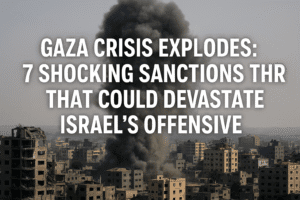Gaza Crisis Explodes: 7 Shocking Sanctions Threats That Could Devastate Israel’s Offensive
The Gaza conflict has intensified dramatically with Israel’s expanded ground offensive, “Gideon’s Chariots,” aiming to dismantle Hamas but resulting in severe civilian casualties and the closure of Gaza’s last hospital in the north. Over 53,000 Palestinians have died since the war began, with millions facing famine amid a crippling blockade that limits humanitarian aid to a fraction of what is needed. The UK, France, and Canada have jointly threatened targeted sanctions against Israel unless it halts its offensive and allows unhindered aid access, signaling a major shift among Israel’s traditional allies.
Meanwhile, ceasefire talks remain stalled, with Hamas demanding full Israeli withdrawal and Israel insisting on disarmament. Diplomatic efforts, including U.S. mediation, have yet to break the deadlock, while aid agencies warn Gaza is on the brink of catastrophe. Israeli Prime Minister Netanyahu faces growing international and domestic pressure as the humanitarian crisis deepens. The situation tests global resolve to uphold humanitarian law and raises urgent questions about the future of the region. The world awaits whether diplomatic threats will compel change or if Gaza’s suffering will worsen unchecked.

Gaza Crisis Explodes: 7 Shocking Sanctions Threats That Could Devastate Israel’s Offensive
The escalating conflict in Gaza has drawn unprecedented warnings from key Western nations, as Israel’s latest military campaign—codenamed Gideon’s Chariots—faces mounting global condemnation. With hundreds killed in recent days and aid access critically restricted, the UK, France, and Canada have jointly threatened targeted sanctions unless Israel halts its offensive and lifts barriers to humanitarian relief. Here’s an analysis of the crisis and its far-reaching implications.
The Offensive: Tactics and Toll
Israel’s expanded ground operation, launched over the weekend, marks its most aggressive military push since the war began in October 2023. The IDF claims the offensive targets Hamas strongholds in northern and southern Gaza, aiming to dismantle the group’s infrastructure and secure the release of hostages. However, Palestinian health authorities report devastating civilian casualties: 136 deaths in 24 hours, including entire families, and the closure of Gaza’s last functioning hospital in the north.
The operation follows weeks of airstrikes that destroyed residential areas, displaced thousands, and deepened Gaza’s humanitarian catastrophe. Over 53,000 Palestinians have now been killed since the war’s onset, with women and children comprising the majority, according to Gaza’s Health Ministry.
Humanitarian Crisis Reaches Breaking Point
Aid agencies warn that Gaza’s 2.1 million residents face imminent famine after 19 months of siege. Despite Israel’s pledge to permit a “basic amount of food” into Gaza, UN officials describe current aid levels as a “drop in the ocean.” Only five trucks entered via the Kerem Shalom crossing this week, far below the 500 daily trucks needed to stave off starvation.
- Healthcare Collapse: The bombing of Khan Younis’ Nasser Medical Complex destroyed critical supplies, leaving injured civilians without treatment.
- Displacement: Over 1.7 million Gazans are internally displaced, many sheltering in rubble or overcrowded tents with minimal access to clean water.
Critics argue Israel’s recent allowance of limited aid is a tactical concession to avert international backlash rather than a genuine commitment to civilian welfare.
Diplomatic Pressure Mounts
The UK, France, and Canada’s threat of sanctions signals a pivotal shift among Israel’s traditional allies. Their joint statement demands an immediate ceasefire, unhindered aid access, and warns of “concrete actions” if ignored. While specifics remain undisclosed, potential measures could include asset freezes or travel bans on officials tied to settlement expansion or human rights violations.
Netanyahu’s Dilemma: The Israeli PM faces mounting pressure both externally and domestically. While far-right coalition partners oppose any aid to Gaza, Netanyahu acknowledged that famine would erode global support, including from the U.S. Congressional allies. His balancing act—maintaining military operations while appeasing international donors—grows increasingly precarious.
Ceasefire Talks Stalled
Indirect negotiations in Doha have yielded little progress. Hamas insists on a permanent ceasefire and Israeli withdrawal before releasing hostages, while Israel demands Hamas’ disarmament. A proposed 60-day truce in exchange for 7–9 hostages was rejected by Hamas leaders, who called for a comprehensive deal.
U.S. Role Under Scrutiny: President Trump’s recent Middle East tour failed to broker a breakthrough. His remarks advocating for the U.S. to “take” Gaza and create a “freedom zone” drew criticism for oversimplifying the conflict’s complexities. Meanwhile, the controversial Gaza Humanitarian Foundation (GHF)—a U.S.-backed aid mechanism—faces skepticism from the UN, which argues existing frameworks could deliver aid if Israel cooperates.
The Path Forward
- Sanctions as Leverage: Targeted measures could pressure Israel to moderate tactics, though Netanyahu has dismissed them as “rewarding Hamas.”
- Aid Access: Immediate reopening of crossings like Rafah and Kerem Shalom is critical to prevent mass starvation.
- Regional Diplomacy: Sustained engagement by Arab states and the UN remains vital to revive credible ceasefire talks.
Why This Matters
The conflict’s trajectory hinges on whether Israel recalibrates its approach amid growing isolation. For Palestinians, each delayed aid truck exacerbates suffering; for Israel, continued offensives risk lasting damage to its international standing. As the world watches, the stakes extend beyond Gaza—testing the global community’s ability to enforce humanitarian norms and hold combatants accountable.
The coming days will reveal whether diplomatic threats translate into action or if Gaza’s plight further descends into unchecked catastrophe.
You must be logged in to post a comment.